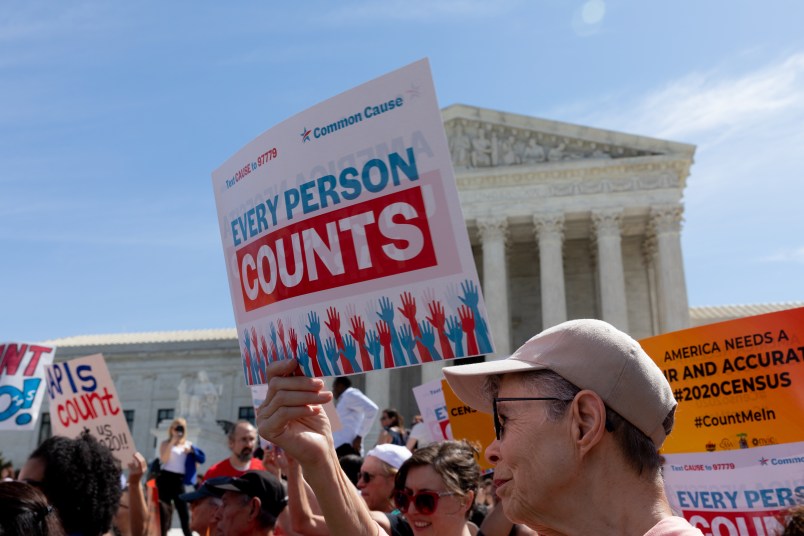Latino and immigrant rights groups filed a lawsuit Friday afternoon seeking to block the Trump administration from collecting citizenship data to be used for redistricting.
If President Trump’s data collection project is successful, it may lead to states excluding noncitizens from the count they use to draw legislative maps — shifting political power away from growing immigrant communities and toward whiter, more rural areas of the county.
The lawsuit alleges that the Census Bureau’s collection of citizenship data for this purpose violates the Constitution’s Equal Protection clause, and that the move to do so also violates the Administrative Procedures Act.
“Defendants’ actions should also be enjoined because they are motivated by racial animus, are discriminatory toward Latinos and non-citizens, and are the result of a partisan conspiracy intended to dilute the representation of non-citizens and Latinos,” the lawsuit says.
The groups suing the administration — La Unión del Pueblo Entero and Promise Arizona, who are being represented by Asian Americans Advancing Justice and the Mexican American Legal Defense and Education Fund (MALDEF) — were among those who also challenged in court the administration’s attempt to add a citizenship question to the census.
The Justice Department declined to comment on the lawsuit, while a spokesperson from the Commerce Department, which oversees the 2020 census, did not respond to TPM’s inquiry. The Census Bureau also did not comment on the lawsuit.
The Supreme Court invalidated Commerce Secretary Wilbur Ross’ decision to add the question because the justification he gave in doing so — that it would enhance enforcement of the Voting Rights Act — was bogus.
The Census Bureau is now collecting citizenship data using existing government records and said last week that it plans to release the data alongside the redistricting data provided to states in early 2021.
President Trump’s executive order directing the Bureau to collect the data — which came after a Ross directive that had already put the project in motion — explicitly cited its usefulness for redistricting as a reason to do so.
When MALDEF and the other groups challenged the citizenship question, the Maryland federal judge overseeing the MALDEF case seemed open to the argument that excluding noncitizens from redistricting would constitute a discriminatory intent behind adding the question. That judge, U.S. District Judge George Hazel, has been assigned this new case.
In the citizenship question litigation, the groups raised the possibility that redistricting was the true motive for adding the question after files were found on a now-deceased GOP gerrymandering expert’s hard drives suggesting that he was more involved in the effort than previously known.
His files also included a study showing the partisan GOP benefits in reducing the representation of immigrant groups via a citizenship-based redistricting metric.
Altogether, the files show that the current data collection project “was motivated by a racially discriminatory scheme to reduce Latino representation and increase over-representation of non-Latino Whites, thereby serving Republican political ends at Latinos’ expense,” the new lawsuit says.
Read the lawsuit below:







Unfortunately, the suit has a basic conceptual flaw: If Latino and other immigrant groups could be counted on to vote Republican, or if the districts with a lot of non-citizens tended to vote Republican, Trump and his minions would be just fine with including non-citizens in the census and the count for representation. So it’s really political, not racial or ethnic discrimination that’s at work here.
(Does it make a difference? I think it should not. But political discrimination is generally given a pass.)
IIRC, there is a constitutional requirement for this. Is there any conditional count suggestion? I know the 3/5 rule went out a hundred years ago, but where are the additional conditions?
What on earth is “Latinx”? My whole family is Latino and I know of no one who uses this term. It’s proper to use Latino when referring to mixed gender. If you really must have a gender neutral word try “Latin” or “Hispanic”. This oh so careful woke language is tiresome. The problems of gender inequality can’t be solved by grammatical reform and it just detracts from the message this article is trying to convey.
Your right, the Constitution says count everyone. Even when the 3/5ths rule was law, all noncitizen slaves were counted - thus an obvious example of original intent for the Right Wing Justices.
I heard that Article II of the Constitution says Trump can do whatever he wants.
Not other presidents, mind you, but Trump exclusively. It’s really in there. I heard someone say so.